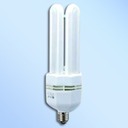Solar Power Tower in Almeria, Spain
This type of technology is very viable for small island developing states in areas of the world that receive lots of sunshine. Spain is a leader in solar power, as could be the Cayman Islands.
Hydrogen powered compact vehicle
Offshore wind turbines
Wind turbines are an option that must be explored for small island developing states.
Ocean Thermal Conversion
Ocean thermal conversion is a viable energy production technology. A positive spinoff is the fact that it would also produce fresh water.
Oil Platform
Wind Turbine
Wind turbines are available in many sizes and different designs. This makes them a viable alternative for residential use. Cayman Brac Power is investigating the use of wind power on the Brac.
Compact Fluorescent Energy Saving Lamp
Compact Fluorescent Bulbs should replace all incandescent bulbs under 100 watts. They will in the long term save you money, although there is a front end cost incurred in purchasing them. Realize that you have to compare the cost of five years worth of incandescent bulbs to one compact fluorescent bulb. We will be posting a Excel spreadsheet shortly giving a calculation of the savings possible.
World Energy Routes
With oil having to be shipped around the world, the transport of it is vulnerable to many security and environmental risks, not to mention putting the end users at the mercy of the producing nations.
Zenn electric car
Electric vehicles are perfect for the Cayman Islands, they have all the features of any compact car with none of the negatives. Plug them in at night to charge and drive to work in silence in the morning bypassing the gas station!
The Zenn unadorned
A range of approximately 70 miles on a charge, speeds of up to 50 miles per hour, seat belts, air-conditioning and no pollution.
Honda fcx Hybrid
2003 Honda FCX Highlights
* The 2003 Honda FCX is powered by a hydrogen fuel cell that produces electricity onboard the vehicle. A fuel cell combines hydrogen (stored in a tank) with oxygen in the air to make electricity (and water as a byproduct.) Electricity powers the electric motor, which in turn propels the vehicle.
* Honda's FCX was certified by the Environmental Protection Agency (EPA) and the California Air Resources Board (CARB) in July 2002 making it the first fuel cell car in history to be certified for commercial use.
* Unique Honda technology in the FCX includes the Honda designed Ultra Capacitor that stores energy generated by the fuel cell (and energy from regenerative braking) for quick bursts of power during acceleration.
* The FCX uses technology from a variety of existing Honda products. The EV Plus electric vehicle (produced from 1997 to1999) provides the platform for the FCX and like the EV Plus, the FCX uses an electric motor for propulsion. Honda's existing research in electric vehicles (EV Plus), compressed natural gas vehicles (Civic GX) and Hybrid vehicles (Insight and Civic Hybrid) provide valuable real world experience in performance and safety issues related to gaseous fuel storage and high voltage safety in a vehicle.
* The FCX provides good driving characteristics. The 201-lb.-ft. of torque produced by the FCX's electric motor is comparable to the torque produced by a V-6 engine. Overall performance is comparable to a Honda Civic.
Cartoon
Climate change and peak oil are very serious concerns for the international community, however a bit of humour is necessary!
Solar power using the Sterling engine
The Stirling engine was invented in 1847, and was ahead of its time to say the least. No one knew what to do with it for a very long time, it worked, it produced energy from heat, but was a Victorian curiosity until the United States Navy modernized it for use on submarines. Today Stirling Energy Systems are using this engine at the focal point of a solar reflector to provide motive power
Solar Panels
The Cayman Islands has its first completely solar home which has broken ground. It will use solar power to create hydrogen which will be stored in a 500 gallon tank and fed to a fuel cell which creates electricity to power the home. The air-conditioning will be powered by geo-thermal temperature differential. This technology will give us energy independence and cost savings as the price of oil rises. See Home page



